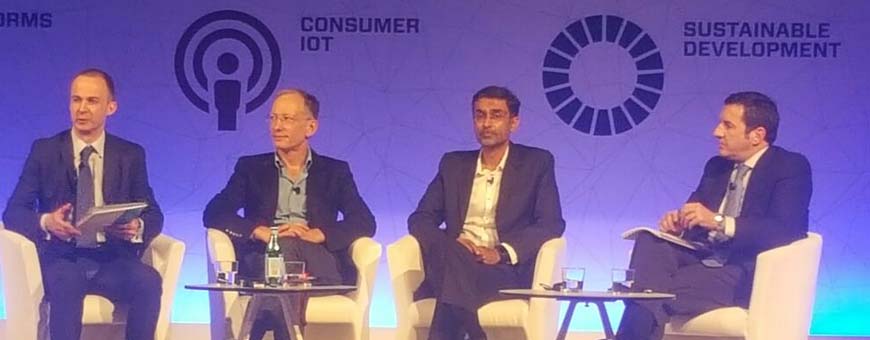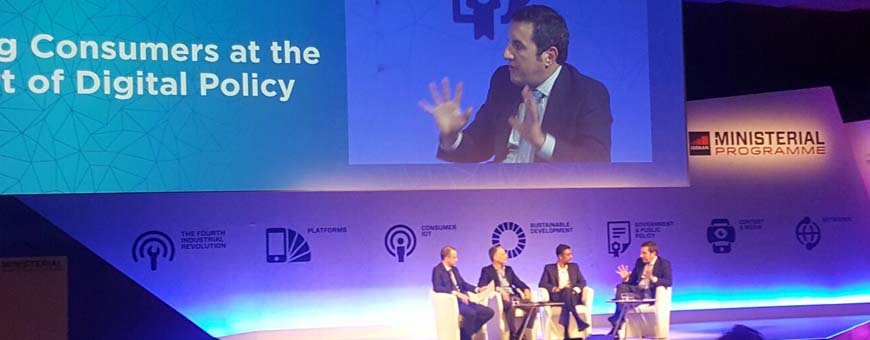Ana Velázquez Palomera
Public Affairs and Regulation, Telefónica.
Enrique Medina, Chief Policy Officer at Telefónica, has participated this week in “Putting consumers at the heart of the digital policy” panel from GSMA’s Ministerial Programme which was held alongside Mobile World Congress in Barcelona. This initiative is designed for government and industry leaders to exchange views on the state of the mobile industry and the policies and initiatives that can maximize value for citizens in our digital age.
This interesting panel was moderated by Mark Page, Managing Partner at AT Kearney, and also counted with Rajiv Bawa, Head of Public and Regulatory Affairs at Asia Telenor Group and Peter Fleischer, Global Privacy Counsel at Google.
The panelists had the opportunity to share their views on how consumers must be put at the heart of the digital policy in order to succeed in the digital era.

Some questions were raised ranging from personal’s data citizens education, movement of data across borders and the right balance of consumers’ protection and innovation including the impact of net neutrality principles. Panel members agreed that privacy and security are the key concepts that must be considered in the making of the new digital economy.
They pointed out that enhancing consumer trust is the cornerstone for success in a dynamic and complex digital era. Therefore, putting consumers at the heart of the digital policy means putting the digital confidence at the heart of digital policies.
Building digital confidence in a data era
The panelists framed the digital confidence issue within the explosion of data. They agreed on how data can enrich customer’s lives, enhance company decision making, and be a force for good in society, although they also recognized that, on the other side of the coin, data explosion has its own drawbacks and that more and more, the deluge of data or its misuse generates fear over privacy and security, jeopardizing the world of opportunities.
The panelists shared the view that the first step in building digital confidence is ensuring that individuals have the digital skills needed to make a meaningful use of these opportunities.
They also agreed on educating consumers about how they can better protect their personal information, manage their privacy and teach organizations about how privacy is good for business.
In this regard, Enrique Medina explained that from Telefónica’s point of view, educating digital consumers is the first step to achieve an environment of trust and secureness. Accordingly, he said, “our commitment has led us to design a culture based on training and awareness-raising”.
The panel members’ comments were largely similar on this issue and focused on the idea that companies that are transparent about the information they gather, give customers control of their personal data and offer fair value in return for it will be trusted and will earn ongoing and even expanded access. Moreover, as Enrique Medina pointed out that this idea was the seed for the development of Telefónica’s 4th Platform.
In this regard, Enrique Medina defined Telefónica as a data-driven company which aims “to guarantee that citizens have a safer Internet experience and trust in order to promote the use of all digital possibilities. This is what we call “Digital Confidence”.
The executive said that the key to generate digital confidence is transparency and empowerment. Therefore, there is a need for improving transparency and tools that will allow users to have full control of their privacy, as well as a better security protection for when they are using the Internet. He stated that “creating the digital confidence we ensure a safe and reliable digital experience, critical to the new society and economy”.

International Data Flows
The panel also discussed about international data flows as another issue that must be addressed in order to ensure consumers’ privacy protection.
In this regard, Enrique Medina stated that two main ideas must inspire the approach to global data flows:
1) Promoting respect for privacy as a fundamental value
2) Ensuring that businesses of all sizes along the whole value chain comply with applicable regulations related to data and consumer protection.
It was stated that globally there is a general recognition that there should be some law regarding cross-border data transfers, but a wide variety of approaches to this issue exist and were also shown in the debate. The panelists agreed that data localization measures are not the right answer to data privacy and accordingly, Enrique Medina said that he believed that the EU is in the right track since the Commission’s aim is to do away with “unjustified restrictions to the free movement of data across borders as well as several legal uncertainties”.
Regarding cross-border data flows outside Europe, the panelists’ approaches where similar on substance since all of them agreed that those cross-border data flows are essential to facilitate transatlantic trade and to realise innovative business models in the digital economy.
However, on this point it was proven that the US and the EU have confronted positions: the US is proposing the “free flow of data” and the elimination of any obligations to store data in-country or to build data servers while the EU needs to accommodate a regime to allow the flow of data, ensuring compliance with EU data protection rules. However, all the panelists welcome the EU-US Privacy Shield, although they recognized that there was still much work to be done to have a future-proof and sustainable agreement that provide an adequate level protection of data privacy for global citizens.
On this point, Enrique Medina contributed to the discussions with a simple solution: the full commitment by all parties to respect the local obligations of the customer’s country of residence. He added “it is the only way to strengthen the confidence of citizens, businesses and the sovereignty of nations in this Digital Economy”.










